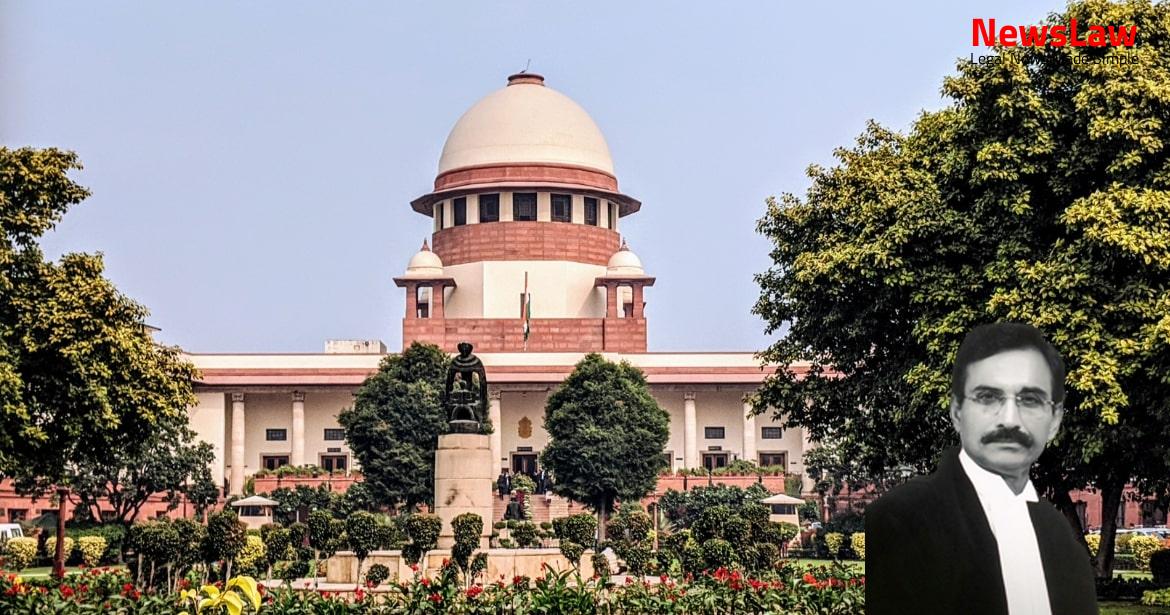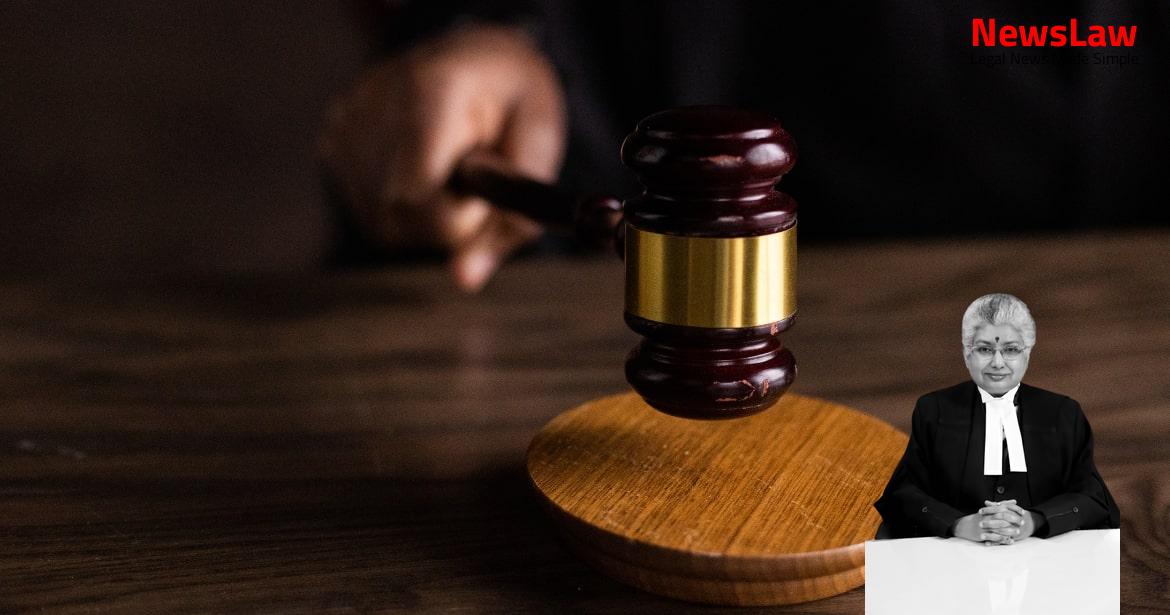Explore a case where legal intricacies surrounding dying declarations and unlawful assembly were meticulously analyzed by the court. The focus was on establishing the accused’s involvement through the dying declaration, leading to a conviction for rioting with a deadly weapon and culpable homicide. The court’s interpretation of legal frameworks like Section 149 IPC and Section 148 IPC added depth to the case, setting precedence for future legal proceedings in similar contexts.
Facts
- The Trial Court awarded life imprisonment for the offence under Section 302 IPC and three years R.I. for the offence under Section 148 IPC to accused Subhash @ Pappu.
- The High Court acquitted accused Subhash @ Pappu as there was no allegation against him for inflicting the knife blow in the stomach of the deceased.
- The High Court noted contradictions in the witness depositions regarding who gave the knife blow in the stomach of the deceased.
- Accused Subhash @ Pappu appealed the Trial Court’s conviction based on the dying declaration, leading to the case being heard by the High Court.
- Accused Subhash @ Pappu surrendered before the court on 06.02.1981 after being shown as absconding.
- FIR alleged Subhash @ Pappu, Pramod, and Munna Lal along with three unknown persons committed the offense armed with weapons at a shop.
- Charge sheet filed against all accused for offenses including Sections 147, 148, 323, 324 IPC.
- Victim Bengali made a dying declaration on 05.12.1980 before Additional City Magistrate Agra and passed away on 04.01.1981.
- Prosecution examined 10 witnesses including medical examiners, officers, informants, and technicians.
- Accused Subhash @ Pappu and others charged with offenses under Section 148 and Section 302 of IPC.
- Accused denied committing any offense during the trial.
Also Read: Ruling on Circumstantial Evidence in Murder Case
Arguments
- The petitioner argues that the respondent should be convicted under Section 302 IPC read with Section 149 IPC, based on his participation in the unlawful assembly and the common object to kill the deceased.
- The petitioner contests the assertion that the respondent can be convicted under Section 304 Part II IPC due to the deceased’s death after thirty days and treatment complications.
- The petitioner challenges the reliability of the dying declaration, emphasizing that the emergency situation and severity of the deceased’s condition justify its recording, contrary to previous case law interpretations.
- It is argued that the High Court erred in acquitting the accused based on contradictions between the FIR and the dying declaration, as well as the interpretation of the number of individuals constituting an unlawful assembly.
- The petitioner stresses the importance of the dying declaration as the sole evidence available connecting the respondent to the crime and calls for the conviction based on this evidence.
- Legal precedents supporting the petitioner’s arguments for conviction under Sections 302 and 148 IPC are cited, emphasizing the acceptance of dying declarations as admissible evidence.
Also Read: Challenging Legal Presumptions in Negotiable Instrument Cases
Analysis
- The accused can be convicted for the offence under Section 302 with the aid of Section 149 IPC.
- The respondent accused was specifically named in the dying declaration.
- The ingredients of Section 149 IPC are satisfied as per the charges framed against the accused.
- Non-recovery of the weapon used does not invalidate reliance on the dying declaration.
- The respondent – accused’s participation in the unlawful assembly was established through the dying declaration.
- Even if the accused’s role was hitting the deceased with a hockey stick, he can still be held guilty under Section 149 IPC for the murder.
- Involvement of six to seven persons in the offence was proven, despite only three being charged/tried.
- The accusal under Section 148 IPC stands valid based on the established involvement of multiple persons in the crime.
- The Trial Court rightly relied on the dying declaration recorded by the Assistant Divisional Transport Officer.
- The dying declaration established the presence of the accused, Subhash @ Pappu, at the time of the incident and his involvement in the offense.
- The accused was part of an unlawful assembly and was charged under Section 148 IPC for rioting with a deadly weapon.
- Although the accused was not specifically charged under Section 302 r/w Section 149 IPC, the Trial Court observed that he knowingly and intentionally caused the death of the victim.
- The respondent was rightfully convicted by the Trial Court for the offense under Section 148 IPC.
- The accused in the case pleaded not guilty and claimed to be tried.
- The charges framed clearly outlined the ingredients for the offence under Section 302 read with Section 149 and Section 148 of the IPC.
- Although there was a defective framing of the charge by not specifically charging under Section 149 IPC, it was considered a mere omission or error.
- The court stated that the absence of a specific charge under Section 149 would not vitiate the conviction unless prejudice was caused to the accused.
- Referring to Section 464 of the Cr.P.C., the court concluded that a mere defect in language or narration does not automatically nullify the conviction.
- Section 148 of IPC punishes those guilty of rioting while armed with a deadly weapon
- Rioting is defined in Section 146 IPC as the use of force or violence by an unlawful assembly in pursuit of a common object
- Section 464 Cr.P.C. states that a finding or order shall not be deemed invalid solely due to omission, absence, error, or irregularity in the charge unless a failure of justice has been caused
Also Read: Legal Analysis Critique in High Court’s Quashing Order
Decision
- Accused Subhash Chand @ Pappu charged with being part of an unlawful assembly and committing rioting with a deadly weapon with the intention to murder Bengali at Galle Ki Mandi on 04.12.1980.
- Accused not pleaded guilty to be tried.
- Respondent to surrender within four weeks to serve the remaining sentence.
- Appeal allowed only partially, and accused directed to be tried on the said charge.
- Accused sentenced to ten years R.I. for the offence under Section 304 Part I r/w Section 149 IPC with a fine of Rs. 5,000/-.
- In default of fine payment, accused to undergo six months further R.I.
- Accused also sentenced to three years R.I. for the offence under Section 148 IPC with a fine of Rs. 5,000/-.
- In default of fine payment, accused to undergo two months further R.I.
- Impugned judgment of High Court acquitting the accused for the offence under Section 302 IPC quashed and set aside.
- Accused held guilty for the offence under Section 304 Part I r/w Section 149 IPC and for the offence under Section 148 IPC, with both sentences to run concurrently.
Case Title: THE STATE OF UTTAR PRADESH Vs. SUBHASH @ PAPPU (2022 INSC 382)
Case Number: Crl.A. No.-000436-000436 / 2022



